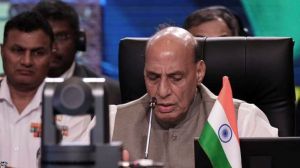Kaunain Sheriff M is an award-winning investigative journalist and the National Health Editor at The Indian Express. He is the author of Johnson & Johnson Files: The Indian Secrets of a Global Giant, an investigation into one of the world’s most powerful pharmaceutical companies. With over a decade of experience, Kaunain brings deep expertise in three areas of investigative journalism: law, health, and data. He currently leads The Indian Express newsroom’s in-depth coverage of health. His work has earned some of the most prestigious honours in journalism, including the Ramnath Goenka Award for Excellence in Journalism, the Society of Publishers in Asia (SOPA) Award, and the Mumbai Press Club’s Red Ink Award. Kaunain has also collaborated on major global investigations. He was part of the Implant Files project with the International Consortium of Investigative Journalists (ICIJ), which exposed malpractices in the medical device industry across the world. He also contributed to an international investigation that uncovered how a Chinese big-data firm was monitoring thousands of prominent Indian individuals and institutions in real time. Over the years, he has reported on several high-profile criminal trials, including the Hashimpura massacre, the 2G spectrum scam, and the coal block allocation case. Within The Indian Express, he has been honoured three times with the Indian Express Excellence Award for his investigations—on the anti-Sikh riots, the Vyapam exam scam, and the abuse of the National Security Act in Uttar Pradesh. ... Read More
94 out of 120 orders quashed: Allahabad High Court calls out abuse of NSA in Uttar Pradesh
Between January 2018 and December 2020, the Allahabad High Court ruled in 120 habeas corpus petitions challenging preventive detention under the NSA. In 94 detentions, it quashed orders of DMs in as many as 32 districts and ordered the release of the detainees.
 The Indian Express tracks legal records of all the NSA cases that were dismissed to find out what Allahabad High Court said and why.
The Indian Express tracks legal records of all the NSA cases that were dismissed to find out what Allahabad High Court said and why.
Police FIRs that cut and paste key details across different locations; detention orders signed by District Magistrates that show “non-application of mind”; denial of due process to the accused; repeated use of the law to block bail — in case after case, the Allahabad High Court has red-flagged the way the UP government has used the draconian National Security Act (NSA) which gives the state powers to arrest without formal charge or trial.
An investigation by The Indian Express of police and court records reveals a telling pattern.
Between January 2018 and December 2020, the Allahabad High Court ruled in 120 habeas corpus petitions challenging preventive detention under the NSA. In 94 detentions, it quashed orders of DMs in as many as 32 districts and ordered the release of the detainees.
Cow slaughter, records show, is Category Number One when it comes to invoking NSA: it accounts for 41 cases, more than a third of the total that reached the High Court. All the accused are from the minority community and were detained by the District Magistrate based on FIRs alleging cow slaughter.
In 30 of these cases — more than 70% — the High Court came down heavily on the UP administration: it quashed the NSA order and called for the release of the petitioner.
Even in the remaining 11 cow-slaughter cases where it upheld detention, except in one, the lower court and the High Court subsequently granted bail to the accused making it clear that their judicial custody was not required.
In each cow-slaughter case, records investigated by The Indian Express show, the DMs virtually echo each other to state that the reason to invoke NSA was that the accused had moved for bail and their release was “imminent.” And that if the accused was out of jail, he would “again” indulge in “activities prejudicial to public order”.
The Indian Express investigation identified key red flags raised by the courts while setting aside the NSA orders on cow-slaughter detentions. For each, an illustrative case is listed (see page 6):
* In as many as 11 detentions, the court cited “non-application of mind” by the DM while passing the order.
* In 13 detentions, the court said the detained person was denied the opportunity to represent himself effectively while challenging the NSA.
* In seven detentions, the court noted that these cases came under the ambit of “law & order” and there was no need to invoke the NSA.
* In six detentions, the court flagged that NSA was invoked on the basis of a solitary case — and that the accused had no criminal antecedents.
Strongly suggesting a common playbook for the administration, there are several examples of cut and paste in the FIRs: In nine detentions, the NSA was invoked on the basis of FIRs that claimed that police were set into action on the basis of a lead given by an anonymous “informer” on the cow slaughter.
Thirteen detentions were based on FIRs that claimed that slaughter allegedly took place in an “open agricultural field” or a forest; in nine detentions, DMs relied upon FIRs that said the slaughter allegedly took place inside the four walls of a private residence; and in five detentions, DMs relied upon FIRs that said slaughter allegedly took place outside a shop.
The 41 rulings on the cases related to alleged cow slaughter were delivered by ten two-judge benches of the Allahabad High Court, involving a total of 16 judges.
The Indian Express sent a detailed questionnaire to UP Chief Secretary R K Tiwari seeking the state government’s response to whether there has been a review of NSA orders issued by DMs that were quashed by the High Court and if any corrective action has been taken. The Chief Secretary was also asked whether the court rulings show a need for stronger checks and balances before DMs invoke the NSA, and if the government plans to appeal them.
There was no response.
Not just the content of the FIRs, even the grounds of detention mentioned by the DMs in NSA orders are strikingly identical — and in many cases ad verbatim.
Consider these:
* In seven detentions alleging cow-slaughter, the NSA order said that “atmosphere of fear and terror has engulfed the whole vicinity”.
* In six detentions, the NSA orders used six identical grounds: some “unknown persons” fled from the spot; minutes after the incident, police personnel were “attacked”; due to attack on the police party, “people started running helter-skelter and the situation has become tense”; people “started running to reach to a safe place”; due to the “atmosphere, people are not attending their day to day work”; due to the act of the accused, “peace and tranquility of the area and law and order situation was badly disturbed”.
* In two detentions, the NSA orders have identical grounds: “women, in particular, became reluctant to go out of their house and do their routine work”; and that “tempo of life was adversely affected and the public order was shattered”.
* In two other detentions, the grounds were the same: “An atmosphere of fear had developed, nearby girls school was closed as also doors of the neighbouring houses”.






- 01
- 02
- 03
- 04
- 05


























